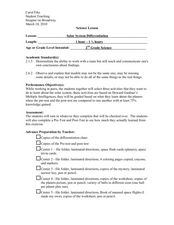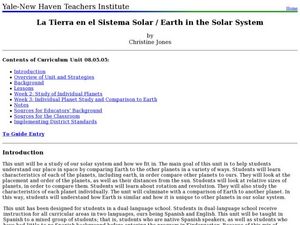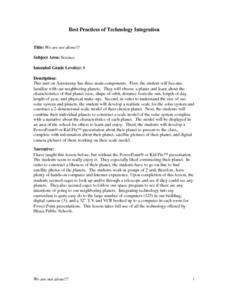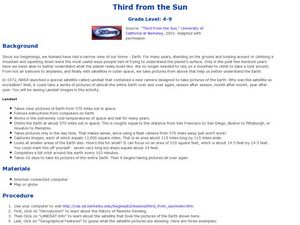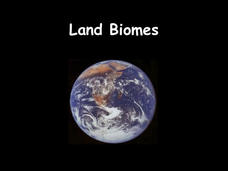Curated OER
Where in Our Solar System Are We?
Second graders research distance between planets and the sun using encyclopedias. They use toilet paper sheets as a unit of measurement (50 million km.) students stand at planet locations using toilet paper to measure distance between.
Curated OER
Solar System Differentiation
Students explore the solar system. In this solar system science instructional activity, students choose 3 out of 12 centers to visit, each of which contains an activity related to the planets. The station activities are designed to...
American Museum of Natural History
Make a Terrarium
Scholars read a brief overview of what a terrarium is and how it creates the greenhouse effect, then click on a link to discover the materials and 10 steps they need to build their own.
Curated OER
Earth in the Solar System
A three-week unit designed to be completed in an elementary level, dual-language immersion classroom, this resource includes several lessons intended to introduce young learners to the solar system, the Earth and how the Earth compares...
Curated OER
The Contest Between the Sun and the Wind
Students investigate the relationship between the sun and wind. In this reading comprehension lesson, students read the book The Contest Between the Sun and the Wind, and observe the effect of the Sun and wind on our planet. Students...
Curated OER
Space Science
Eighth graders study the objects in our solar system. In this space lesson students identify and describe planets, then classify them as terrestrial or gaseous.
Curated OER
The Solar System
In this solar system worksheet, students determine the correct unit of measurement to use when measuring a list of items. Students list the five outer planets and four inner planets. This worksheet has 20 fill in the blank questions.
Curated OER
The Solar System
Students examine effects of the sun on the planets in our solar system.
Curated OER
We Are Not Alone!!!
Eighth graders explore the area of astronomy. They explore Earth's neighboring planets. Students research a planet's characteristics. They develop a scale model of the solar system and a narrative about the planets.
Curated OER
KNOW YOUR PLACE IN SPACE
Students examine the positions of the nine planets in respect to our solar system and explain the unique characteristics of each planet.
Curated OER
Jupiter
A student-produced PowerPoint provides basic facts about the planet of Jupiter. Illustrated slides highlight its physical attributes and satellites. A lot of interesting information about Jupiter is included, such as the fact that twenty...
Curated OER
Third from the Sun
Students examine images from space. In this third from the Sun instructional activity, students examine images from, Landsat, the satellite launched by NASA in 1972.
Concord Consortium
The Six Faces of Amzora
Here's a task that is out of this world! Given a description of a fictional cube-shaped planet, scholars answer a set of questions about the planet. They create a two-dimensional map and consider the distances between locations on the map.
It's About Time
Orbits and Effects
What does your world revolve around? Challenge the class as they learn about orbits and the effects of them on our modern world. Young astronomers begin by measuring ellipses and calculating the eccentricity of Earth's orbit. Then, they...
ESL Kid Stuff
Our World
There's a beautiful world all around us! Learn about the features of our planet with a series of activities designed for English learners. Kids sing, dance, and read about nature with fun lessons and interactive play.
Curated OER
The Nine Planets
Sixth graders examine and investigate the solar system. They participate in a Webquest, and create a Powerpoint presentation that is meant to be a research guide to help alien visitors find a suitable habitat in the solar system.
Curated OER
A Model of the Sun's interior
Young scholars create a three-dimensional model of the sun. In this solar system activity, students design a scale model of the sun using plasticine.
Illustrative Mathematics
Tilt of Earth's Axis and the Four Seasons
Geometry meets earth science as high schoolers investigate the cause and features of the four seasons. The effects of Earth's axis tilt features prominently, along with both the rotation of the earth about the axis and its orbit about...
Curated OER
Sizing Up The Solar System
Students investigate and design various models of size and distance related to the solar system. They work together to build a solar system model. The models should focus on distance and scale. They don't include moons or satellites in...
Biology Junction
Land Biomes
Biomes share similar climates and ecosystems, despite being separated geographically on the planet. A presentation introduces the six most common land biomes. It focuses on the commonalities in climate, plants, and animals with many...
Curated OER
Our Changing View of the Solar System
Students identify and name the eight planets and the five dwarf planets in our solar system. In this space science lesson, students view a slideshow of the planets and label them on an included Solar System chart.
Curated OER
Our Solar System
Students study the Earth and Solar System through a variety of activities. They compile a coloring book show the characteristics of the Sun and nine planets.
Curated OER
The Solar System
Fourth graders name the planets of the solar system in order from the Sun to Pluto and recognize the planets by pictures shown in class.
Curated OER
The Solar System
Students explore planets of the solar system, write reports, and create dioramas.



